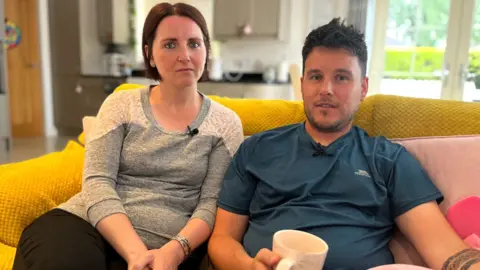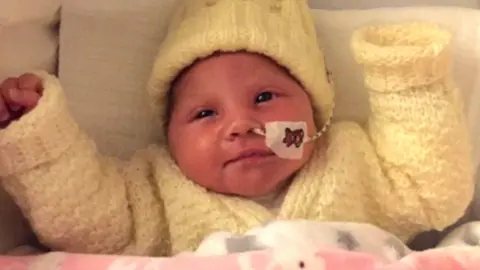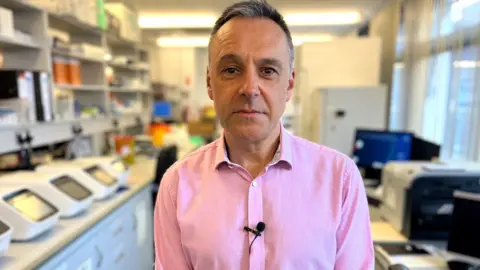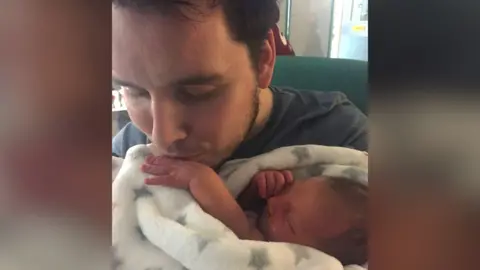 BBC
BBC“I am very happy that the stories of their children and their short lives are now helping other families.”
Laura O’Hare’s daughters both died after being born with a rare genetic disorder.
At first she and her husband Michael were left with questions about what had happened.
But the answer will finally come from an innovative project that has been mapping the DNA of rare diseases in the UK.
For more than 10 years 100,000 Genomes Project has traced and compared the genomes of tens of thousands of patients with rare diseases and their relatives.
Anna and Olivia
Michael and Laura, who now live in Lurgan, were among the first participants from Northern Ireland.
Their first daughter Anna was born in 2016 but died 29 days later.
Laura said: “At the 20-week scan we were told there was a problem, and when he passed away we were heartbroken.
“But at that stage, the medical staff thought it was only one and we wanted to try for another child.”
 The O’Hare Family
The O’Hare FamilyIn 2017, her second daughter Olivia was born, but she died 64 days later.
Michael said: “We were devastated and not having an answer at that stage was very difficult.
“But after Olivia, the doctors started to realize that it could be genetic and that’s when we were introduced to the 100,000 genome project and Dr. McKee, and that changed everything.”
The 100,000 Genomes Project
Dr Shane McKee is from County Tyrone and is currently a consultant in Genetic Medicine at the Belfast Trust.
He leads the Northern Ireland branch of the UK-wide project.
Since 2013, it has used the latest technology to analyze the complete genetic sequence of 100,000 patients in the UK with rare disorders and their family members, together with cancer patients,
Northern Ireland was invited to join the project in 2015, involving five health trusts, two universities and the NI Rare Disease Partnership (NIRDP).

Dr McKee said: “Our genome and our DNA is the guide that holds us all together, and we are all made up of it, containing a wealth of information.
“For example, if you printed one person’s DNA on a normal-sized piece of paper and stacked it, it would be the size of the Eiffel Tower.”
Dr McKee added: “So the 100,000 genomes project has been very ambitious, to sequence the genomes of all these people to try and find small changes.
“Luckily we have a big computer to help, and the goal is to try and give the family some answers.”
Answer
After meeting Laura and Michael after the deaths of their children, Dr. McKee enrolled them in the 100,000 genome project.
This would eventually lead to the discovery that her daughter had a rare disease known as Fowler’s Syndrome.
It is a genetic disorder that affects the embryo as it grows in the womb.
This causes the blood vessels in the brain’s membrane to enlarge and become a barrier that prevents cells from migrating from the inside of the brain to the outside of the brain.
Laura says being able to name her children’s genetic condition has been invaluable in the grieving process.
“It helps bring closure, and we also recognize that most children with Fowler’s Syndrome will pass before birth or soon after.
“So it makes the weeks we spend with our two girls even more special, knowing they defied the odds.”
Dr McKee said helping to find the exact genetic cause of rare diseases would ultimately help advance scientific understanding and hopefully design better treatments.

He added: “Laura and Michael’s participation, as well as the participation of hundreds of other families in Northern Ireland will certainly help others and already has.
“Laura gave me permission to talk about her children while teaching medical students about genetics, and that was very powerful.”
Michael said: “We may not be able to spend our lives with them, but the fact that the girls are able to help other families is amazing.
“As a father, if I want my girls to go on and achieve something, you can’t ask for anything more than that, I’m proud of them.”
A rare disorder is defined as a condition that affects fewer than five per 10,000 people in the population.
Around 100,000 people in Northern Ireland – one in 17 – are affected by the rare disorder.
If you have been affected by any of the issues in this article, help and support is available at BBC Action Line.





